- Home
- About Us
- Our Services
- Specialities
- Clinical Treatments
- Psychological Counselling
- Autism Spectrum Disorder
- Alzheimer’s Disease
- Bipolar Disorder Treatment
- Brain Stroke
- Career Counseling
- Couples Counseling
- Dementia
- Dissociative Disorders
- Low Self-Esteem
- Parkinsons
- Personality Disorders
- Post – Stroke Rehabilitation
- Post-Traumatic Stress Disorder
- Schizophrenia Treatment
- Sleep Disorders
- Psychodiagnostics
- Mindfulness
- Doctor’s
- Package’s
- Blogs
- Contact Us
- Home
- About Us
- Our Services
- Specialities
- Clinical Treatments
- Psychological Counselling
- Autism Spectrum Disorder
- Alzheimer’s Disease
- Bipolar Disorder Treatment
- Brain Stroke
- Career Counseling
- Couples Counseling
- Dementia
- Dissociative Disorders
- Low Self-Esteem
- Parkinsons
- Personality Disorders
- Post – Stroke Rehabilitation
- Post-Traumatic Stress Disorder
- Schizophrenia Treatment
- Sleep Disorders
- Psychodiagnostics
- Mindfulness
- Doctor’s
- Package’s
- Blogs
- Contact Us


